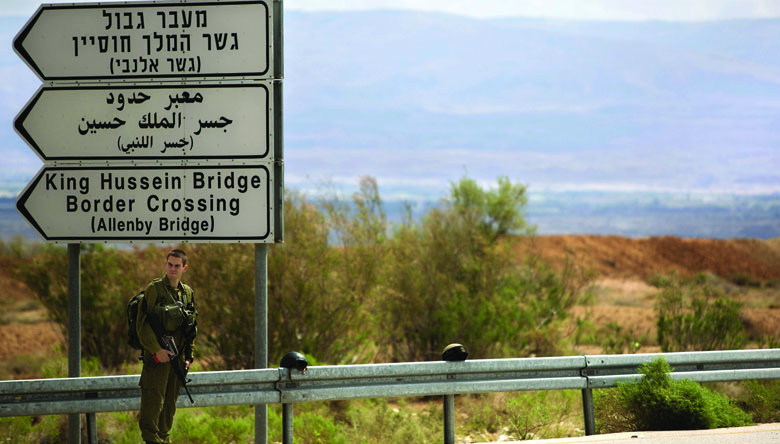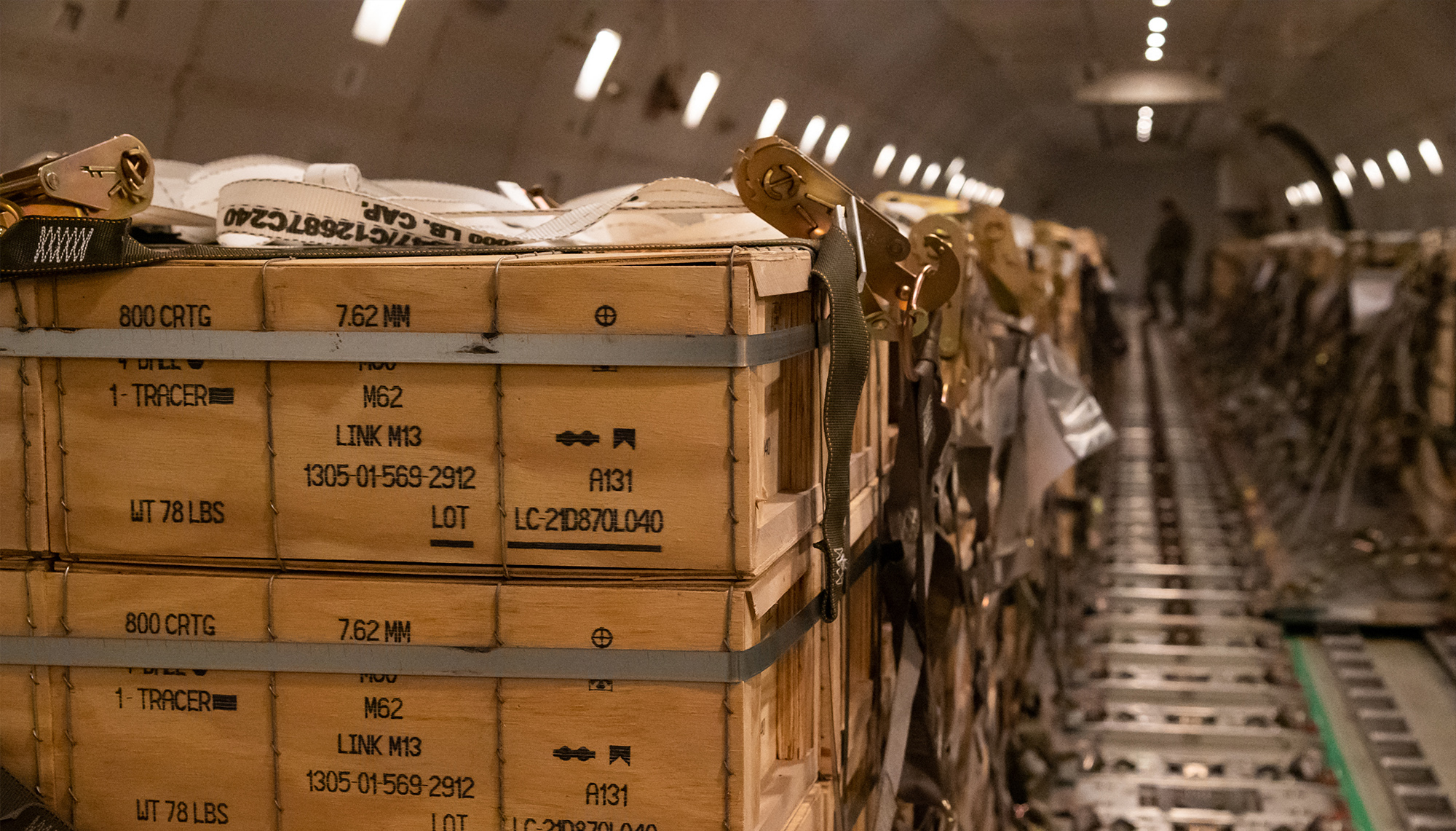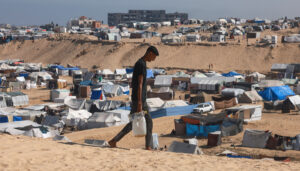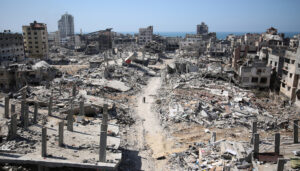By Hanadi Qawasmi
Translated by Hani Barghouthi
Anxiety in your stomach, heart racing, and muttering underneath your breath; this is what a Palestinian handing over their passport or ID to Israeli passport control looks like at the Allenby Bridge that connects Palestine and Jordan. It is the only bridge through which citizens of the West Bank can make their way out into the world.
After a lengthy wait and a humiliating interrogation about your belt, your watch, your handbag, your hairband, and the pins in your hijab, you make your way to passport control. “Take a seat and wait over there” is a sentence no Palestinian wants to hear in that situation. This wait usually means long hours, and possibly an interrogation by the secret service. In the worst case scenario, it may mean a travel ban.
Bissan Jaber (25 years, from Hebron south of the West Bank) graduated with a Law degree three years ago, and started working as a human rights lawyer. Bissan has been invited to several conferences outside Palestine, and was accepted into a Master’s program in Germany. These are all opportunities she had to miss after being placed on a travel blacklist by the Israeli Occupation forces.
Bissan says that aside from one of her sisters, every member of her family of ten – eight children and her parents – have separately been and remain banned from travel. Bissan has never left Palestine, and is also banned from entering the occupied 1948 territory.
Painful irony dictates that, instead of happily counting the times she’s travelled out of her country like many people do, she counts the times she and members of her family were banned from travelling. Her father last left the country in the eighties. For her mother it was 1991. For her siblings, it has been a few years.
Entire Palestinian Cities Blacklisted
According to “Hurryyat”, the Center for Defense of Liberties and Civil Rights in Ramallah, Israeli Occupation authorities turned away nearly 700 Palestinians from the Karama Bridge between January and July 2016. In 2015, it was 2700, and in 2014 (the year when three settlers were kidnapped and murdered and the aggression against Gaza took place) the number increased to 5000.
Hilmi Alaraj, director of Hurryyat, says these numbers may seem low because they only reflect those who wanted to travel outside Palestine, packed their bags, and actually headed to the Bridge, only to be told to return because they were banned from travelling. By his judgement, it is not enough to only take those people into consideration in order to gauge an accurate estimate. Everyone on the blacklist needs to be considered, including those who have not come near the bridge in years, he says.
According to a 2014 report published by Hurryyat, the net number of blacklisted Palestinians in the West Bank was tens of thousands. The same report claims that, according to figures published by the Authority on Civil Rights, the number in Hebron alone was over 60,000. In the province of Qalqilya, it was 18,000, and 21,000 in Tulkarm.
Blacklisted Demographics
Palestinians on the blacklist belong to different age and social demographics; men and women, old and young. For example, a 75-year-old woman is blacklisted because her son is a imprisoned by the Occupation authorities.
Alaraj says that the most commonly blacklisted demographics are former prisoners and their relatives. This is the case even if a person was only in prison for a few months. It has become a given that if a Palestinian is a former prisoner, they will likely not be allowed to travel, he says. Alaraj himself was blacklisted for over 30 years as a result of separate instances of imprisonment during the eighties and nineties. He was only permitted to travel again in 2015, and still worries that his permission may be revoked.
This is corroborated by writer and ex-prisoner Ismat Mansour, also blacklisted, who says that being banned from travel is the norm from freed prisoners. He says that it is also quite common for a relative to be banned as well, as is the case for most families of prisoners freed by the Gilad Shalit Prisoner Exchange, who in turn were banished out of Palestine.
Ismat was released in 2013 as part of the second batch of freed prisoners when negotiations with the Palestinian Authority began, having completed twenty of the 22-year sentence. He was informed, along with some of his fellow prisoners, that as soon as they were released they would not be allowed to travel. At the time, the ban included travel outside their cities, along with occupied 1948 areas and international travel. A year after their release, Ismat and the rest were allowed to leave their cities and travel within the West bank. For “security reasons,” however, the ban on international travel was still in effect.
Like many others on the blacklist, Ismat was denied many opportunities to participate in human rights conferences related to prisoners, and cultural and literary seminars (as a writer). The most recent example was an invitation to attend a book fair in Amman. Ismat says the most difficult part of this situation is that there is no time limit. Instead, it is up to the “discretion of secret services” with no clear end date.
Ghada Abdelhadi, who spent less than 10 non-consecutive months in Israeli prisons in the seventies and eighties, is still banned from traveling to this day. “I’ve spent my entire life on a blacklist with few scattered exceptions. They allowed me, for example, to travel to Jordan for only a week to visit my sick daughter, with the condition that I don’t leave Jordan,” she said in a conversation with 7iber.
Ghada tells the story of how her serial bans began; she was supposed to get married in 1972 to a Palestinian man who works in the UAE, and he came to ask her to marry him in Nablus. When she started preparing for travel and obtaining proper documents to leave Palestine, only two days before the wedding, she and her family were shocked to learn that she was not allowed to travel. She says that the Israeli officer said to her fiancé, “couldn’t you find someone else to marry? There’s no way she’s going to travel.” She added that they gave her the choice of either leaving now but never returning, or accepting the ban. She chose the ban, and the marriage never happened.
Lawyer Nasser Odeh, who takes on cases of blacklisted people, compared travel bans to systematic arrest. Most bans are justified by claims that they are based on “security measures and confidential files,” giving no further explanations. In some cases, the Occupation authorities will release more information on a ban, stating that it is a result of “fear that a blacklisted person may establish contact with terrorist parties”, or that they have “a security record and previous ties to terrorist organisation.”
According to the Israeli military law which governs the West Bank, bans are only within the jurisdiction of the military leader of the West Bank. In reality, however, it is enough according to Odeh for the “captain” of an area, village or city to recommend a ban on someone without “disturbing” the leader’s peace. Naturally, this increases the number of banned people because of the ease with which a ban can be issued. This violates the laws that exist in Jerusalem and the Occupied 1948 borders, in which a ban requires the approval and signature of the Occupation’s Home Secretary.
Odeh says that available regulations that exist to allow for a fight against a ban are a direct and systematic violation of their right to free movement. Pursuant with orders from the Israeli Military Attaché – the administrative department for the Occupation in the West Bank, a banned person can file a complaint against their ban as long as they provide proper documentation that proves their need to travel, be it for a family visit, to study, medical treatment, and so on.
Pursuant to the same orders, the Israeli Military Attaché must respond to the complaint within eight weeks. Of this, Odeh says “it is very normal in most cases for a response to never be issued. In the cases where it is, it is usually declined, and may take an entire year to come.” Aside from that, there are no special regulations for handling emergency cases like funerals.
Filing a complaint to the Israeli Military Attaché is considered a prerequisite for filing a case in the Israeli Supreme Court. The court may take months to set a date for the case, meaning added delays for the banned party. Usually, the court session will last for a few minutes during which the court will look at confidential files provided by the secret services and listen to the reasons the Palestinian will present for travel.
A few weeks ago, a case concerning two sisters from Hebron (30 and 34) who wanted to travel to Jordan to attend their brother’s wedding was filed by a Palestinian lawyer. The response from the Occupation was that they were both “activists working for hamas”, and that the defence lawyer was not privy to further details or any evidence. The session lasted two minutes, and in it the judge studied the confidential file provided by the secret service and rejected the case, upholding the ban.
In other cases, and based on the reason a Palestinian presents for travel, the court may allow them to travel despite the confidential file, but under strict conditions. Among them is limiting which countries they are allowed to visit, or setting a time limit. In one instance, a woman was given 42 hours to go to Jordan for her daughter’s wedding and return. In other cases, the court will refuse to allow a banned person to travel to specific countries like Turkey and Malaysia for Israeli security considerations, as these countries are considered headquarters for activists in the Palestinian resistance.
The Israeli Occupation uses bans on travel as a tool to punish and limit Palestinians. In 2014, during the period in which the three settlers were kidnapped, the entire population of the Hebron Province aged below 50 were banned from travelling for close to a month and a half as a blatant restrictive procedure to the hub of popular resistance. According to Hilmi Alaraj, bans increased last year after a shooting that took place in Beit Furik in southern Nablus.
Odeh stipulates that in many cases, individuals banned from travel are blackmailed in an attempt to recruit them to work as agents for the Occupation’s intelligence. Odeh clarifies that in those cases, intelligence officers summon the banned person for interrogation and offer them a position as an agent, but do so in a clandestine and indirect way.







